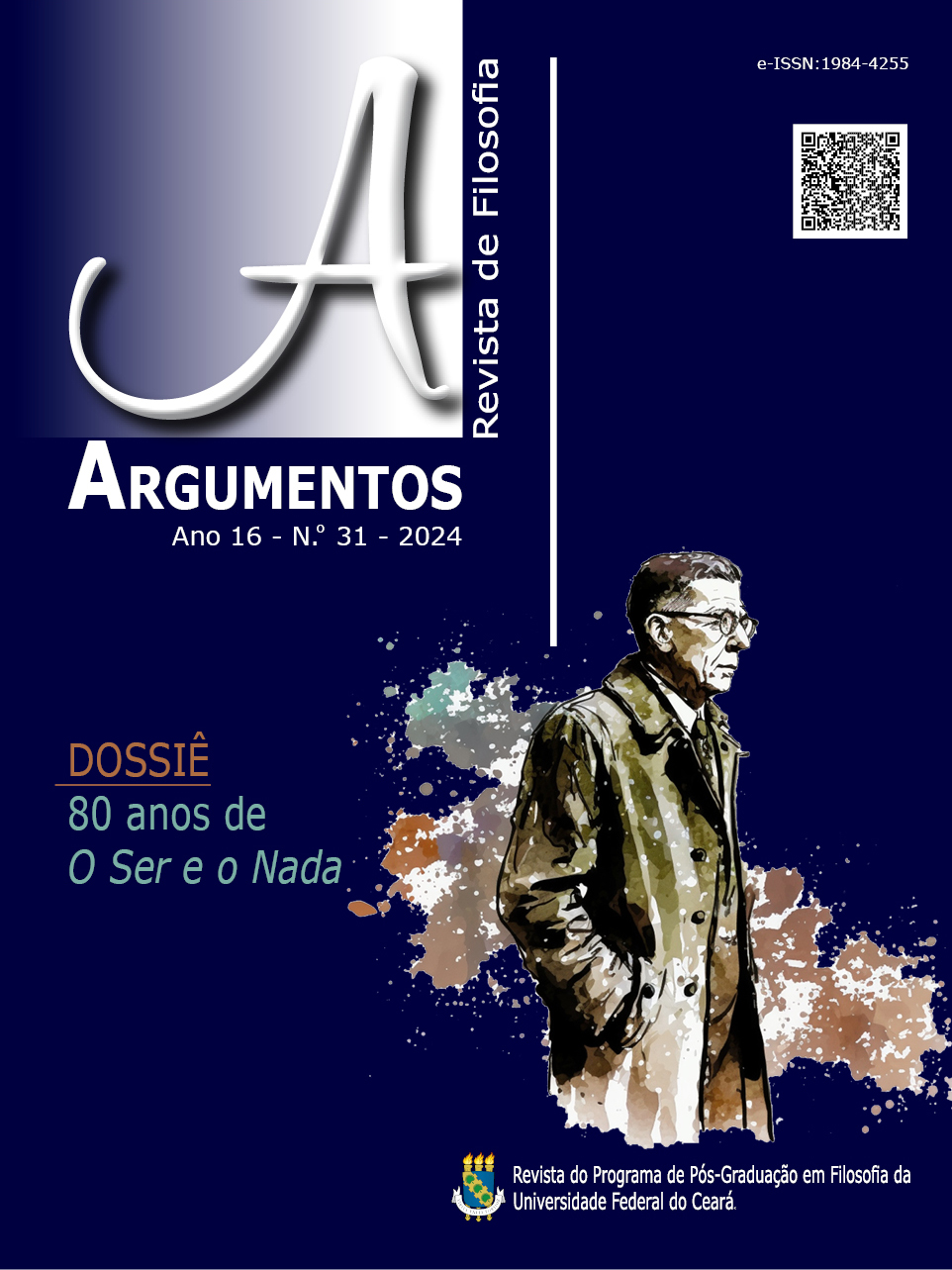A lógica de Buridan: testabilidade e modelos
DOI:
https://doi.org/10.36517/Argumentos.31.15Palabras clave:
Buridan. Carnap. Mental models. Necessity. Reduction.Resumen
A teoria da modalidade que Buridan desenvolve está vinculada com diferentes proposições. Este trabalho aborda uma dessas proposições. O objetivo é mostrar que, se o operador de necessidade incluído nela é ignorado, a proposição permite derivar, dentro da lógica de predicados de primeira ordem, uma sentença de redução com as características requeridas no framework de Carnap. Ademais, o artigo tenta argumentar que o mencionado operador de necessidade pode ser compreendido não apenas em um sentido técnico (como a lógica modal faz), mas também do modo como um indivíduo inocente (sem treinamento em lógica modal) poderia interpretá-lo. Estes últimos argumentos são dados a partir da teoria dos modelos mentais.
Descargas
Citas
BYRNE, R. M. J.; JOHNSON-LAIRD, P. N. If and or: Real and counterfactual possibilities in their truth and probability. Journal of Experimental Psychology: Learning, Memory and Cognition, v. 46, n. 4, p. 760-780, 2020.
CARNAP, R. Meaning and Necessity: A Study in Semantics and Modal Logic. Chicago: The University of Chicago Press, 1947.
CARNAP, R. Testability and meaning. Philosophy of Science, v. 3, n. 4, p. 419-471, 1936.
CARNAP, R. Testability and meaning – Continued. Philosophy of Science, v. 4, n. 1, p. 1-40, 1937.
DAGYS, J.; GIEDRA, H.; PABIJUTAITĖ, Ž. Inferences between Buridan’s modal propositions. Problemos, n. 101, p. 31-41, 2022.
ESPINO, O.; BYRNE, R. M. J.; JOHNSON-LAIRD, P. N. Possibilities and the parallel meanings of factual and counterfactual conditionals. Memory & Cognition, n. 48, p. 1263-1280, 2020.
HODGES, W.; JOHNSTON, S. Medieval modalities and modern method: Avicenna and Buridan. IfCoLog Journal of Logics and Their Applications, v. 4, n. 4, p. 1029-1073, 2017.
JOHNSTON, S. A formal reconstruction of Buridan’s modal syllogism. History and Philosophy of Logic, v. 36, n. 1, p. 2-17, 2015.
JOHNSON-LAIRD, P. N.; BYRNE, R. M. J. Conditionals: A theory of meaning, pragmatics, and inference. Psychological Review, v. 109, n. 4, p. 646-678, 2002.
JOHNSON-LAIRD, P. N.; RAGNI, M. Possibilities as the foundation of reasoning. Cognition, n. 193, p. 1-19, 2019.
KHEMLANI, S.; BYRNE, R. M. J.; JOHNSON-LAIRD, P. N. Facts and possibilities: A model-based theory of sentential reasoning. Cognitive Science, v. 42, n. 6, p. 1887-1924, 2018.
KHEMLANI, S.; HINTERECKER, T.; JOHNSON-LAIRD, P. N. The provenance of modal inference. In: Gunzelmann, G.; Howes, A.; Tenbrink, T.; Davelaar, E. J. (Eds.). Computational Foundations of Cognition. Austin: Cognitive Science Society, 2017.
LÓPEZ-ASTORGA, M. A bilateral reduction sentence for modulation. Balkan Journal of Philosophy, v. 14, n. 2, p. 109-114, 2022a.
LÓPEZ-ASTORGA, M. Fourteen modal theorems consistent with the theory of mental models. Prometeica Revista de Filosofía y Ciencias, n. 25, p. 39-50, 2022b.
QUELHAS, A. C.; RASGA, C.; JOHNSON-LAIRD, P. N. A priori true and false conditionals. Cognitive Science, v. 41, n. 55, p. 1003-1030, 2017.
READ, S. Introduction. In: Buridan, J. Treatise on Consequences. New York: Fordham University Press, 2015.
Descargas
Publicado
Versiones
- 2025-03-28 (2)
- 2024-01-15 (1)
Número
Sección
Licencia
Derechos de autor 2024 Argumentos - Periódico de Filosofia

Esta obra está bajo una licencia internacional Creative Commons Atribución 4.0.
Los autores que publican en esta revista aceptan los siguientes términos:
- Los autores mantienen los DERECHOS AUTORALES otorgados a la revista O el Derecho de Primera Publicación, con el trabajo licenciado simultáneamente a Creative Commons License Attribution (CC BY) que permite compartir el trabajo con reconocimiento de autoría y publicación inicial en esta revista.
- Los autores pueden aceptar contratos, distribución no exclusiva de la versión del trabajo publicado en esta revista (por ejemplo: publicación en el repositorio institucional o como capítulo del libro), con reconocimiento de autoría y publicación inicial en esta revista.
- Se permite a los autores publicar y distribuir su trabajo on-line (por ejemplo, en repositorios institucionales o en su página personal) durante el proceso editorial de información de que el artículo está en proceso de publicación. Esto puede aumentar el impacto y cita de trabajos publicados.

SOBRE COPYRIGHT Y POLÍTICA DE ACCESO LIBRE
La revista utiliza la atribución CC BY



.jpg)










._._3.png)
1.jpg)
._._._.png)
